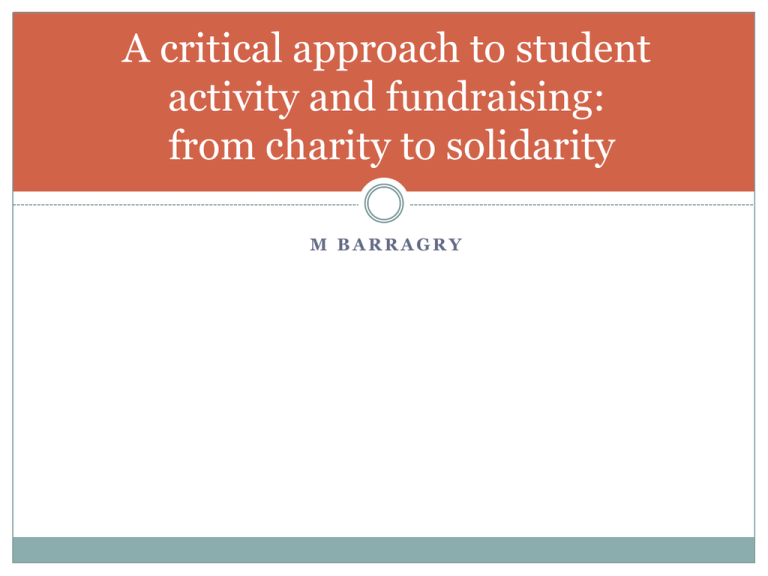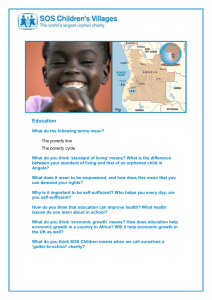Critical Approach to Fundraising and Student Activity M Barragry
advertisement

A critical approach to student activity and fundraising: from charity to solidarity M BARRAGRY To begin….schools exist in their societal context Students do not come into schools with an objective , blank canvas approach to either ideas of poverty, "charity” or fundraising – they have already absorbed much of the discourse from mainstream society. 1.Evolution in ideas of “charity “ Gradual changes in the discourse surrounding “charity”. Language has changed and in recent years there has been a focus on how imagery has been used. As the “Aid Debate” continues, questions regarding the why and how of aid/charity has continued. Alongside this, the “charity / NGO sector has grown significantly . Questions are more prominent in public sphere regarding how organisations use their finances. In Ireland, we have traditionally had a strong "charitable” sector. Historically, this has had its roots in the missionary tradition and arguably, our own experience of famine. Sending “money to the missions” ; “collecting for the black babies” and Trocaire boxes have all been integral elements of the Irish charity psyche. Undoubtedly, a strong charitable impulse exists within Irish society ,but has it emphasised an “us and them” approach? Ireland and the charity context Think; Pair; Share Looking at the “Save the Children” advertisement, what message(s) does this communicate to you? Fundraising, critical thinking and education can co exist http://www.loretofoxrock.ie/news/entry/r un-4-rumbek 2. Students, media and perception Students today absorb ideas, messages and perceptions from a fast moving media world that is speed based, rather than depth based How are students receiving their information? New Media has given us unprecedented access to instant news, and today, everyone has the opportunity to be a commentator and journalist. How discerning are our students in deciphering the material they are faced with? What and who are their sources for information about social justice issues/ Global South? The celebrity messenger? Yes Mr Geldof we Africans DO know it Christmas time Students follow a celebrity infused world: Celebrity Humanitarians? “There can be, in some circumstances, a role for celebrities in marketing a charity's objectives, but we need to ask some deeper questions here. Why should our supporters back education as a human right for all children around the globe, or decent maternity care in Malawi? Because Bono and Stacey Solomon, however wellintentioned, give it their imprimatur, or because these are crying injustices that scar our world and degrade our own humanity? Celebrities can get in the way, the messenger becoming more important than the message.”Are Celebrities a Help or Hindrance to Charity? Peter Stanford Justin Forsythe, The Guardian, 26 July 2011.” 3.The Politics of Altruism: Responsible messaging and fundraising? Images which produce a "shame” response” tend to result in larger amounts of money being donated This has led to the term "poverty porn” being coined Source: The Politics of Altruism - Lissner 1977 Images which perhaps are more intellectually probing but less emotive result in less money being donated. This can cause tensions inter departmentally within NGOs – schools can also be under pressure to raise funds for a “worthy “cause “In such images, poverty is dirt and rags and helplessness." In reality, poverty has many faces and no simple solution. Poverty doesn't only look like a starving child with flies on his face. In fact, poverty doesn't look any particular way. It is multi-faceted and should be depicted as such.” Simplistic imagery depicts simplistic poverty “Poverty porn” makes a complex Poverty Porn Poverty is a result of both individual and systemic problems, involving not only personal circumstances but the social and justice systems in place that either work to empower the poor or perpetuate their condition. However, poverty porn defines poverty as merely the observable suffering resulting from a simple lack of material resources. http://www.huffingtonpost.com/e mily-roenigk/poverty-charitymedia_b_5155627.html human experience understandable, consumable and easily treatable. According to Emily Roenigke a social and digital communications worker for World Relief , poverty porn leads to charity, not activism: donors, not advocates. “Poverty porn” fails to produce both a deeper understanding of the issue of poverty and the necessary structural changes that must occur to effectively address it”. Is it possible to create thought provoking imagery which does not add to stereotyping? What are the representations of homelessness that are used in fundraising campaigns /school projects? Do they look at the complex interrelated web of social ,economic factors or do they reemphasise stereotypes? Often, imagery is used that depicts a single narrative Using critical thinking questioning, students might begin to assess why health problems could make a person more vulnerable to homelessness Two visuals on the same issue : which educates? Who defines the experience of poverty? In their book, When Helping Hurts, authors Steve Corbett and Brian Fikkert explain that the helper and the helped define poverty very differently. Most North American audiences define poverty by physical suffering and a lack of material resources, while the poor define their condition psychologically and emotionally. They use words like shame, inferiority, powerlessness, humiliation, fear, hopelessness, depression, social isolation and voicelessness (World Bank, 1990). 4.Development Education research findings Research has been done in both an international and Irish context regarding the impact of Development Education. Some interesting findings: Tallon and Mc Gregor : Research objective: “ to examine these emotional responses of young people and the demoralising feelings of guilt, sadness and scepticism that arise, often alongside an innocent paternalism and a desire to help” Tallon and Mc Gregor: “Pitying the Third World: towards more progressive emotional responses to development education in schools” Changes in Development Education Development education conducted by INGOs originally emphasised social injustice Informed by radical theorists such as Paolo Freire. Irish researcher Audrey Bryan has argued that since the 1980s, however, Northern INGOs have lost this radical edge and become depoliticised, reducing much of what passes as development education to campaigns based on ‘fun, fasting and fundraising’ Tallon and Mc Gregor:Research findings Although often sympathetic to issues of inequality, a paternalistic tone was observed with many of the students surveyed– very much an “us and them” attitude. Short-term campaign style emphasis engages young people for a while, but does not necessarily promote positive long-term attitudes about development or understanding of systemic issues and the need for change. The structural causes of poverty and the practices of Northern people in the global economy are side-lined as the feel good charitable act becomes prominent. Fundraising often appears to win over critical and deep thinking about development. Concerns regarding Development Education Bourn cites European Union concerns that much of what passes for development education is surface awareness of issues and INGO campaigning, with ‘minimal attention given to deeper learning and understanding’ Bourn :Discourses and Practices around Development Education,” How do we move from surface awareness to meaningful Development Education? Pedagogically, what do we want? CRITICAL THINKING SKILLS Do we apply the “Why” and ”how” questions to whatever projects our school is involved in? Workshop Activity : 15 minutes Task: To apply a critical thinking approach to the designated issue/ activity for your table in the light of today’s presentation Please look at the “Issue /Cause” your table has been assigned There is sheet of “guide questions” to help you discuss your table’s issue Facilitator for each table will take notes of discussion Hither to? Look at the Development Education Guidelines Keep applying the critical “why "and “how” to any campaigns / activates you are undertaking Remember that selecting one or two issues and “going deeper” can often be more effective than trying to cover a multitude of areas It is a balancing act! We do not want students to become cynical or disengaged, nor do we want to teach “well meant” condescension. And remember....... “EDUCATION EITHER FUNCTIONS AS AN INSTRUMENT WHICH IS USED TO FACILITATE INTEGRATION OF THE YOUNGER GENERATION INTO THE LOGIC OF THE PRESENT SYSTEM AND BRING ABOUT CONFORMITY, OR IT BECOMES THE PRACTICE OF FREEDOM, THE MEANS BY WHICH MEN AND WOMEN DEAL CRITICALLY AND CREATIVELY WITH REALITY, AND DISCOVER HOW TO PARTICIPATE IN THE TRANSFORMATION OF THEIR WORLD.” PAULO FREIRE Session Reflection WHAT DO YOU PLAN TO DO AS A RESULT OF THIS SESSION? TAKE THREE MINUTES TO DISCUSS THIS WITH YOUR SCHOOL COLLEAGUES Lunchtime! Many thanks for your attention, and any comments or queries can be sent to me, Miriam Barragry: mbarragry@loretofoxrock.ie





